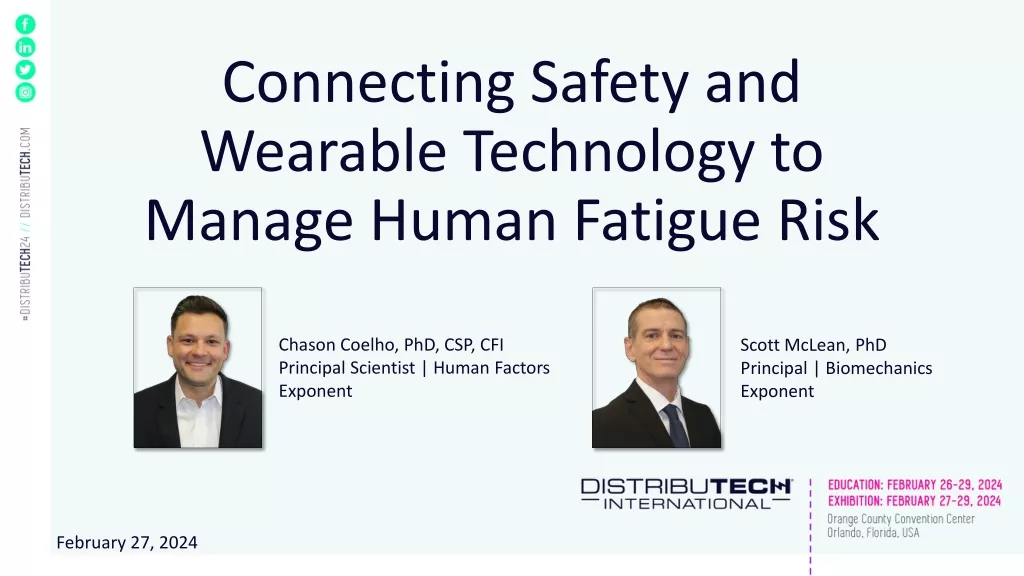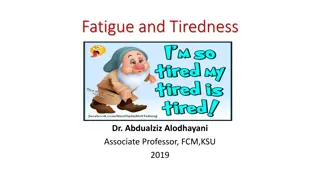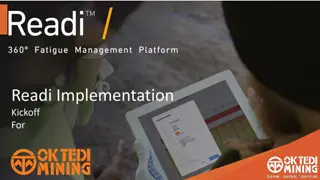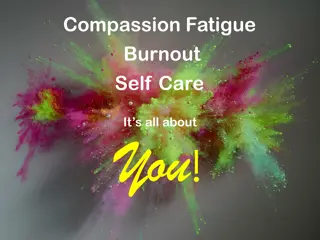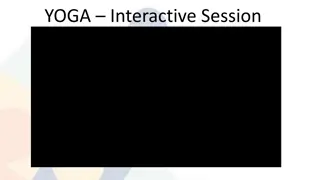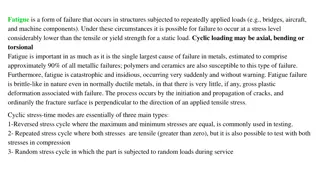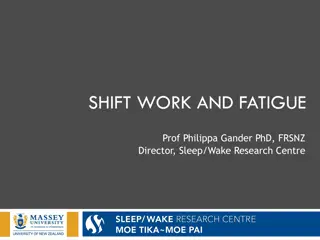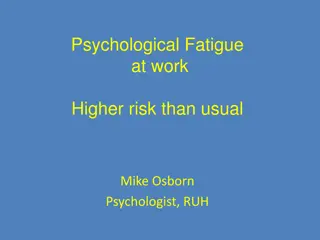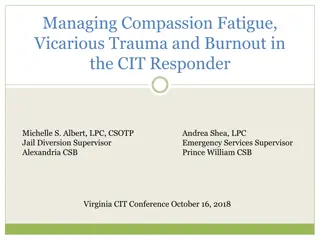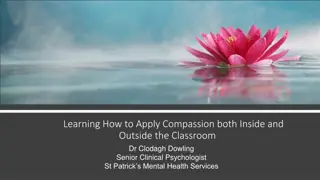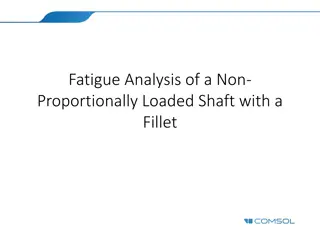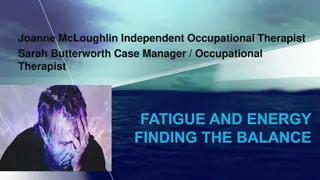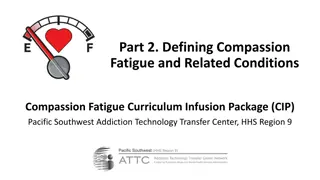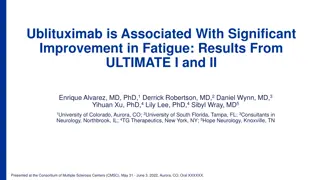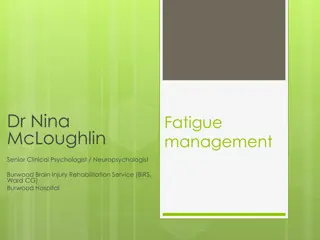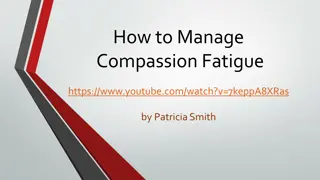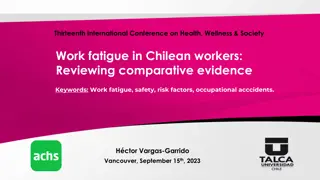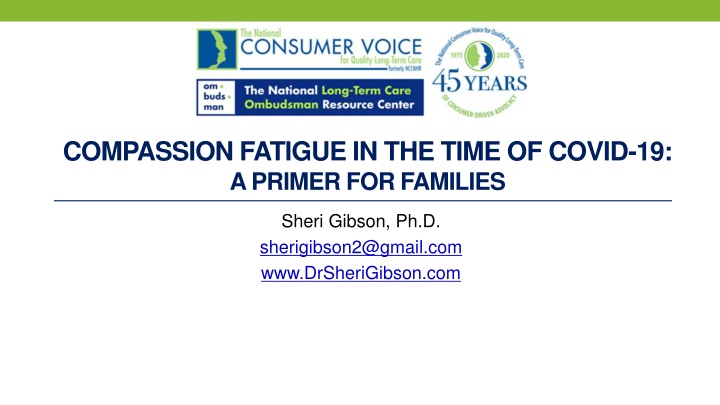
Compassion Fatigue in the Time of COVID-19: A Primer for Families
Caregiving in times of crisis can lead to compassion fatigue. Explore the roots of compassion, its historical significance, and the impact it has in caregiving roles. Understand Figley's model of compassion fatigue development and the importance of self-care for caregivers.
Download Presentation

Please find below an Image/Link to download the presentation.
The content on the website is provided AS IS for your information and personal use only. It may not be sold, licensed, or shared on other websites without obtaining consent from the author. If you encounter any issues during the download, it is possible that the publisher has removed the file from their server.
You are allowed to download the files provided on this website for personal or commercial use, subject to the condition that they are used lawfully. All files are the property of their respective owners.
The content on the website is provided AS IS for your information and personal use only. It may not be sold, licensed, or shared on other websites without obtaining consent from the author.
E N D
Presentation Transcript
COMPASSION FATIGUE IN THE TIME OF COVID-19: A PRIMER FOR FAMILIES Sheri Gibson, Ph.D. sherigibson2@gmail.com www.DrSheriGibson.com
Introduction Caregiving is technically demanding Caregiving also places demands on our humanity Isolation, death, anxiety, grief = the perfect recipe for fatigue and burnout We must attend to ourselves in order to attend to others
Is there light at the end of the tunnel?
Compassion What is compassion? How is compassion different from sympathy and empathy?
Compassion An emotional response when perceiving suffering that involves an authentic desire to help. Derived from Latin and Greek roots pati and pathein meaning to suffer and the Latin root com meaning with.
Compassion as documented in human history Christianity: The Good Samaritan Confucius: Major teacher of the Golden Rule Judaism: The 13 Attributes of Compassion Buddha: Loving kindness and compassion is all our practice. Dalai Lama: Believed the individual experience of compassion radiates outward and increases harmony for all: Compassion is a necessity, not a luxury without it, humanity cannot survive. Charles Darwin: Not survival of the fittest, but survival of the kindest. Communities, which included the greatest number of the most sympathetic members would flourish best, and rear the greatest number of offspring. (Descent of Man and Selection in Relation to Sex, 1898)
Simply put, Compassion is: The feeling of sorrow or concern for another coupled by the desire to alleviate the suffering: I feel for you + I understand you + I want to help
The Study of Compassion Fatigue Term was introduced by Joinson in 1992 and developed by Figley in 1995. Figley developed a model for the process by which compassion fatigue develops. Model has been used to describe development of symptoms across multiple care settings and among persons in different care roles.
Figleys model of Compassion Fatigue
External Factors The Work Environment Societal support Public policy, regulations Social acceptance, activism Work Setting Physical environment Employer values, culture Job tasks, personnel guideline Management, colleagues
The Effects of External Factors The Six Futilities Perception of the Suffering Care recipient demands Institutional Demands Communication, treatment errors Feelings of inadequacy Sense that the care is not benefitting the resident
Also, Internal Factors have an impact The personal gift and curse of empathy High empathy helps us understand and can challenge our equanimity Personal History/Personality Our temperament Family/social history Personal boundaries Unresolved personal trauma Over-generalization: thinking others experiences are similar to ours
Internal Factors, cont. Pathological Altruism A combination of: An excess of empathy An inability to self-regulate Being more focused on relieving one s own discomfort than another s
What Happens to Us? BURNOUT VS. COMPASSION FATIGUE
Burnout Gradual physical, mental, emotional erosion due to long-term involvement in emotionally demanding or unfulfilling situations: Exhaustion: physically, mentally drained Depersonalization: feeling hardened or numb Achievement Void: reduced accomplishment, satisfaction.
Compassion Fatigue Feels similarly to burnout but: Can emerge suddenly Existential/spiritual effects: overarching meaninglessness, worthlessness, hopelessness A sense of isolation from supporters, hyper-vigilance or fear Symptoms often disconnected from real cause
Signs and Symptoms of Compassion Fatigue For the Individual: Difficulty concentrating, pre-occupation, exhaustion Nightmares/flashbacks Over-reactions or avoidance of sensory/emotional stimuli Chronic physical ailments: colds, stomach problems Apathy, anhedonia Excessive negativity: blaming others, complaining Compulsive/avoidant behaviors: substance abuse, over-spending, over-eating, gambling Problems in personal relationships, intimacy Denial of difficulties or problems
Signs and Symptoms of Compassion Fatigue For the Institution: High absenteeism and/or staff turnover Increasing difficulty completing routine tasks, assignments Inability of staff to respect and meet deadlines Unprofessional outbursts of anger, aggression Instability, conflict in staff/team relationships Desire among staff member to break the company rules Staff inflexibility, increased rigidity, resistance to change Excessive complaining, negativity towards management Skepticism or apathy about organizational vision, future Inability of staff to believe improvement is possible
WHY are we susceptible to Compassion Fatigue? Sympathetic Nervous System: Fight, flight, or freeze Is an adaptive response in real crises, but wilts us day in an day out Parasympathetic Nervous System: Restores physiological equanimity Keeps you rooted, helps you tend and thrive
Critical in a Time of COVID-19 Heightened states of: Anxiety Uncertainty Unknown of the future Decision-making / Risk assessment And Chronicity of the above states Perception of no end in sight
How do we protect ourselves? The antidote to vicarious trauma, burnout, and compassion fatigue is: RESILIENCE
Resilience Defined as: The ability of something to return to original shape after it has been pulled, stretched, pressed, bent, etc. The ability to recover from or adjust easily to misfortune or change. We need to develop skills to stay well so that we can attend to all parts of our lives.
Resiliency Skills #1: Self-Awareness Self-Awareness Physical, emotional Existential Self-Awareness Tip: What s happening in your body right now? Muscle tension? Headache? Notice where you are in space and relation with your surroundings.
Resilience Skills Self-Awareness, cont. Self-Awareness Physical, emotional Existential The nature of this pandemic begs all the big questions Spend time consciously exploring your questions about life and death, truth and justice, good, evil Develop a language and a coping strategy to manage suffering, horror, tragedy, and to help find meaning
Resilience Skills #2: Self-Regulation Self-Regulation Boundaries Values Clarification Arousal Management
Resilience Skills #3: Self-Care Self-Care Eat well, exercise, and sleep Right for you! Have fun like your life depends on it It does! Get shallow, simple, and silly for your health! Talking really does help With the right person!
Take a moment: List one mini-escape or diversion that worked well to restore and renew you. List one thing that brings you joy. When was the last time you did it? What gets in the way of doing it more often? What are your personal triggers indicating it s time to recharge your battery?
Resilience Skills Self-Care, cont. TALK IT OUT. Talking is one of the most effective ways of preventing and healing from compassion fatigue Who you talk to is important The person you choose should be someone who: Can really relate Can be present without interfering with your process Doesn t one-up you or switch to their story Needs to understand and honor confidentiality! Utilizing your EAP benefits at your workplace
Final Tips on Preventing Compassion Fatigue Dig where the ground is soft Chinese proverb Avoid your trickiest area to fix, and pick the issue you can most easily visualize changing/improving.
Prevention tips, cont. Take stock of what s on your plate Make a list of all the demands on your time and energy Look at your list carefully; what stands out? What factors contribute to overflowing your plate? Brainstorm with a friend. Start a Self-Care collection Ask friends what they do for self-care; start making your list you may learn new things and new ideas!
Prevention tips, cont. Start a self-care practice with your colleagues: Start a contest for best self-care idea of the week. Initiate 5 minutes of self-care at each staff meeting, where someone is in charge of bringing new ideas to the group. Find time for yourself everyday Rebalance your workload. Delegate work at the office AND at home Create a transition from work to home (which is one in the same) Do you walk? Change clothes? Listen to fun music on the commute? Find a way to transition.
Final thoughts Self-Awareness is key to appreciating your own reactions to stress. View others through a lens of curiosity and empathy find the compassion in your own approach. Utilize key resources to prevent compassion fatigue or intervene when you notice problems.
References Compassion Fatigue Awareness Project (2013) http://www.compassionfatigue.org Davidson, R. and Begley, S. (2013) The Emotional Life of Your Brain: How Its Unique Patterns Affect the Way You Think, Feel an Live and How You Can Change Them. Plume: the Penguin Group. Figley, C. (1995) Compassion Fatigue: Coping With Secondary Traumatic Stress Disorders In Those Who Treat The Traumatized. Rutledge. Halifax, J., Dossey, B. and Rushton, C. (2007, April) Being With Dying: Compassionate End-of-Life Care Training. Conducted at Upaya Zen Center, Santa Fe, New Mexico.
References, cont. Halifax, J. (2012, May 12) Inside Compassion: Edge States, Contemplative Interventions, Neuroscience. Lecture conducted from the U.S. Library of Congress, Washington, D.C. Lester, G. Why Stress Management Doesn t Work for Social Service Professionals and What to Do About It [Audio recording]. United States. Available from https://www.crosscountryeducation.com Professional Quality of Life Elements Theory and Measurement. http://www.proqol.org Day, J. R., and Anderson, R. A. (2011). Compassion fatigue: An application of the concept to informal caregivers of family members with dementia, Nursing Research and Practice, Article ID 408024. doi: 10.1155/2011/408024
Trauma-Informed, Person-Centered Care Resources NORC Trauma-informed care https://ltcombudsman.org/issues/trauma-informed-care Person-centered care - https://ltcombudsman.org/issues/person-centered-care Consumer Voice Resident-Directed Care/Culture Change https://theconsumervoice.org/issues/for- advocates/resident-directed-care My Personal Directions for Quality Living - Blank Form & Sample A tool from Consumer Voice, with edits by SAGE, for individuals to share what matters to them for person-centered care. Information for LTC consumers - https://theconsumervoice.org/issues/recipients Information for Family Members - https://theconsumervoice.org/issues/family
Resources National Long-Term Care Ombudsman Resource Center (NORC) www.ltcombudsman.org Coronavirus Prevention in Long-Term Care Facilities: Information for Ombudsman Programs https://ltcombudsman.org/omb_support/COVID-19 National Consumer Voice for Quality Long-Term Care (Consumer Voice) www.theconsumervoice.org Coronavirus in Long-Term Care Facilities: Information for Advocates https://theconsumervoice.org/issues/other-issues-and-resources/covid-19 Coronavirus in Long-Term Care Facilities: Information for Residents and Families https://theconsumervoice.org/issues/other-issues-and-resources/covid-19/residents-families
Connect with us: www.ltcombudsman.org ombudcenter@theconsumervoice.org cid:image003.jpg@01CFB310.A36779F0 The National LTC Ombudsman Resource Center cid:image004.jpg@01CFB310.A36779F0 @LTCombudcenter Get our app! Search for "LTC Ombudsman Resource Center" in the Apple Store or Google Play This project was supported, in part, by grant number 90OMRC0001-01-00, from the U.S. Administration for Community Living, Department of Health and Human Services, Washington, D.C. 20201. Grantees undertaking projects under government sponsorship are encouraged to express freely their findings and conclusions. Points of view or opinions do not, therefore, necessarily represent official Administration for Community Living policy.

